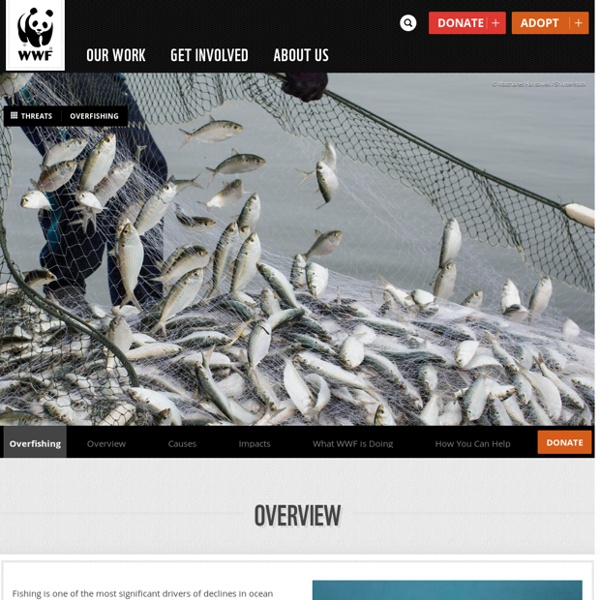



Overfishing -- National Geographic Ocean overfishing is simply the taking of wildlife from the sea at rates too high for fished species to replace themselves. The earliest overfishing occurred in the early 1800s when humans, seeking blubber for lamp oil, decimated the whale population. Some fish that we eat, including Atlantic cod and herring and California's sardines, were also harvested to the brink of extinction by the mid-1900s. Highly disruptive to the food chain, these isolated, regional depletions became global and catastrophic by the late 20th century. When It Started Marine scientists know when widespread overfishing of the seas began. In the mid-20th century, international efforts to increase the availability and affordability of protein-rich foods led to concerted government efforts to increase fishing capacity. But by 1989, when about 90 million tons (metric tons) of catch were taken from the ocean, the industry had hit its high-water mark, and yields have declined or stagnated ever since. When It Will End
Fisheries Campaign - Australian Marine Conservation Society Australia is home to some amazing marine wildlife, much of which is found nowhere else on the planet. Our ocean is a global biodiversity hotspot. We have over 320 different species of sharks and rays, and 70 of these species are unique to Australia, found nowhere else on earth! Unfortunately, commercial fishing using trawlers, gillnets and longlines puts our ocean wildlife at risk. Snubfin dolphins and dugongs drown in gillnets set in the Great Barrier Reef Marine Park to catch barramundi. Seabirds and turtles are killed on longlines set to catch tuna. Overfishing of once abundant species has led to some species being listed as threatened, such as gulper and school sharks, because they have been fished too hard for too long. In a world with an ever-expanding population, we need to ensure that we maintain healthy oceans while we’re taking from the sea, so that we can ensure a future full of fish for generations to come.
Mercury levels: Climate change and overfishing are increasing toxic mercury levels in fish Mercury levels in the seafood supply are on the rise, and climate change and overfishing are partially to blame, according to a new study. Scientists said mercury levels in the oceans have fallen since the late 1990s, but levels in popular fish such as tuna, salmon and swordfish are on the rise. According to a new study by Harvard University researchers in the journal Nature, some fish are adapting to overfishing of small herring and sardines by changing their diets to consume species with higher mercury levels. Based on 30 years of data, methylmercury concentrations in Atlantic cod increased by up to 23% between the 1970s and the 2000s. But overfishing isn't the only contributor to higher mercury levels in fish. The study also found that mercury levels in Atlantic bluefin tuna have increased by an estimated 56% due to seawater temperature rise since 1969. Climate change "is not just about what the weather is like in 10 years," said lead researcher Amina Schartup.
Overfishing: Can We Ever Reverse the Damage We’ve Done? The global numbers regarding fishing have gone from sustainable to straight-up devastating in just a few decades. Now, the creatures of the water have to fear about two more things in addition to human-made disasters - the rising water temperatures and plastic. There is no harm in fishing. But there is a difference between justified consumption and exploitation. In just half a century, over-fished stocked grew triple its size. Even if one species of fish gets wiped off from the earth, it is going to have a very drastic effect on the marine ecosystem. Defining overfishing is simple. Man’s desire to catch rare and magnificent forms of fishes began when we started to conquer the waters. Whaling saw a rapid rise in the mid-19th century, where we embarked on a journey to find blubber. Two years later, in 1929, the number of whales killed rose to 40,201. The whaling practices of this era were so devastating that it pushed eight species of whales to the endangered list in 1970.
Fishing for Answers: How Marine Wildlife and Commercial Fishing Overlap Oceana's new report shows the overlay of fishing activity with tagged blue sharks, demonstrating a cutting-edge approach to study the impacts of commercial fishing activities on marine wildlife and opening the door to inform future conservation and management efforts. Oceana teamed with shark researchers Dr. Austin Gallagher (Beneath the Waves) and Dr. Neil Hammerschlag (University of Miami) to tag ten blue sharks off the East Coast of the United States in June 2016. Read the Press Release